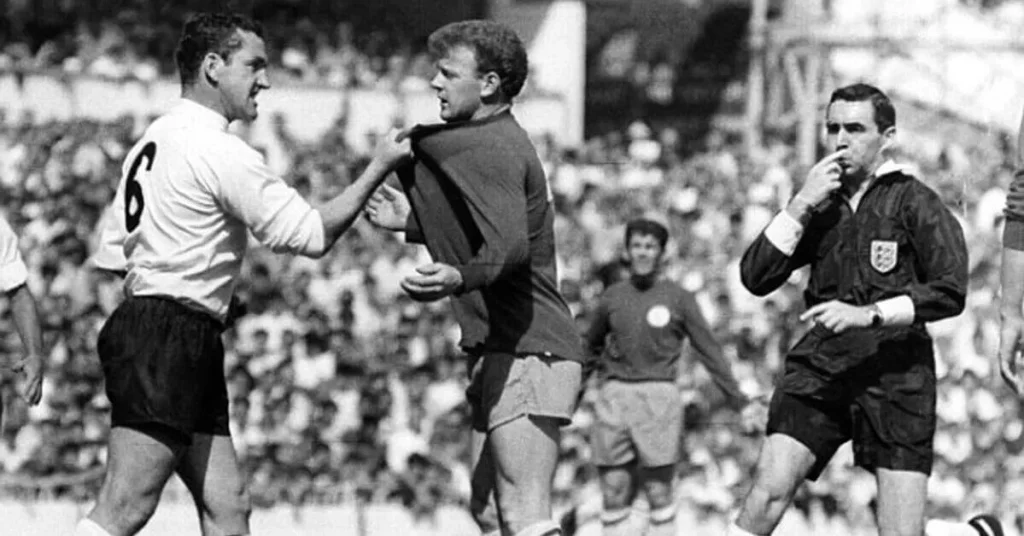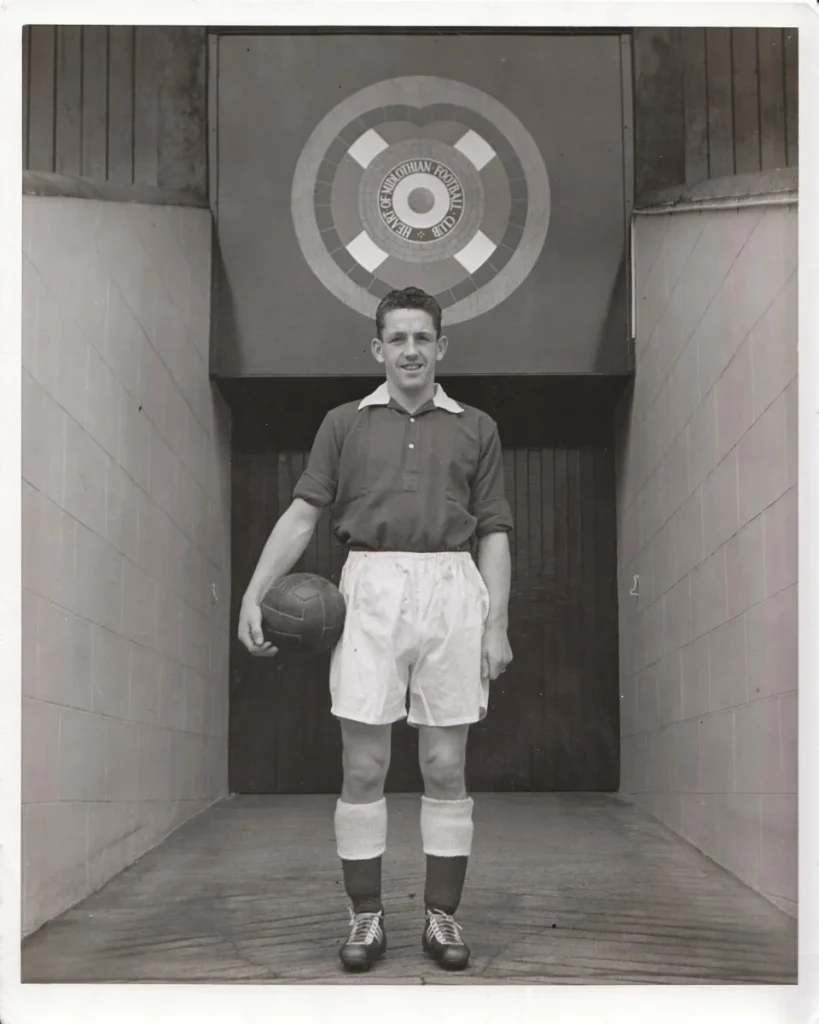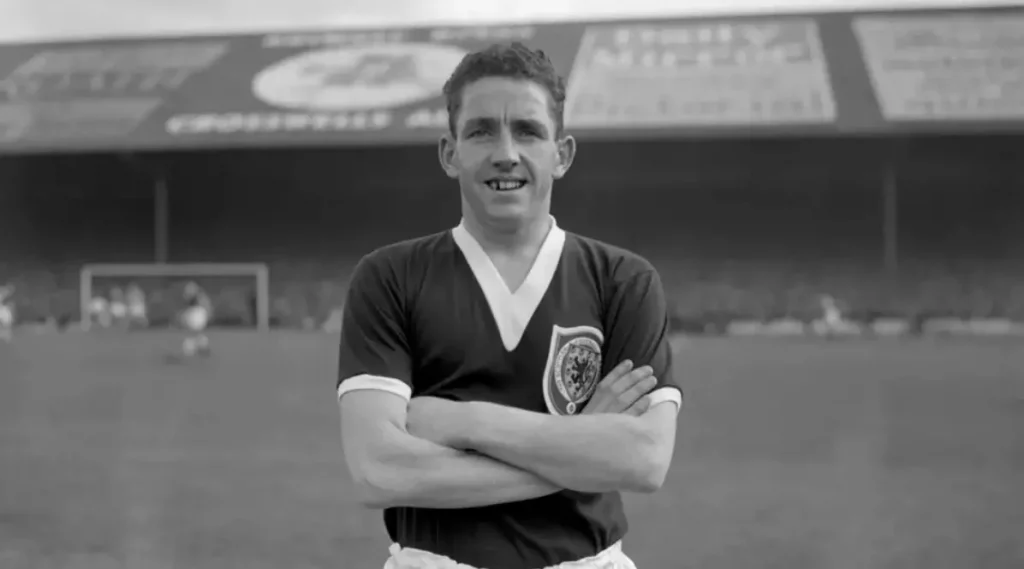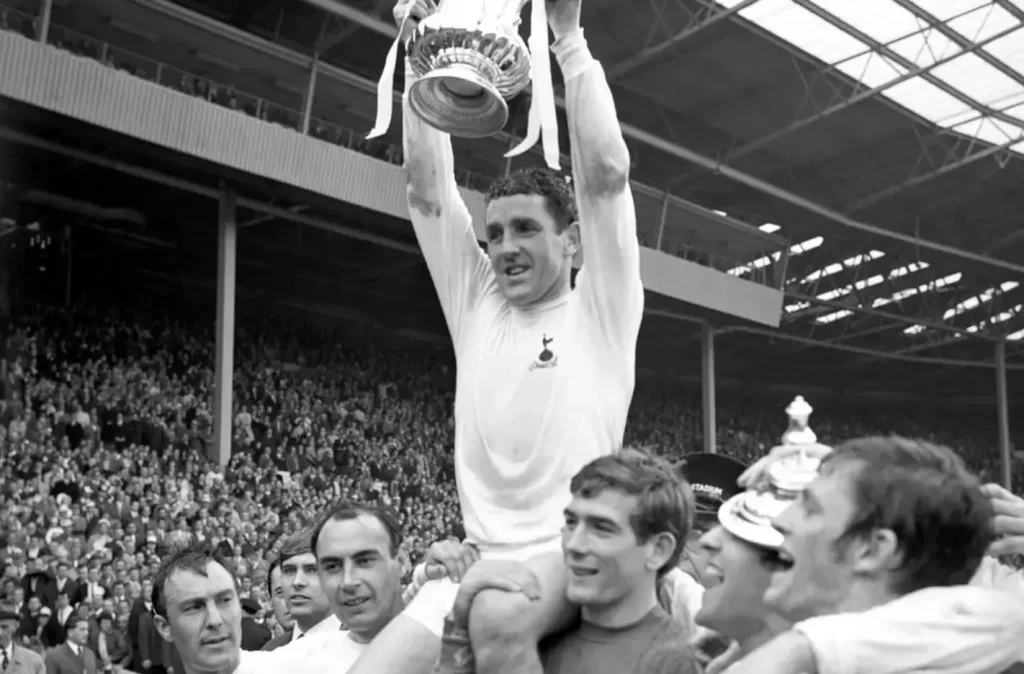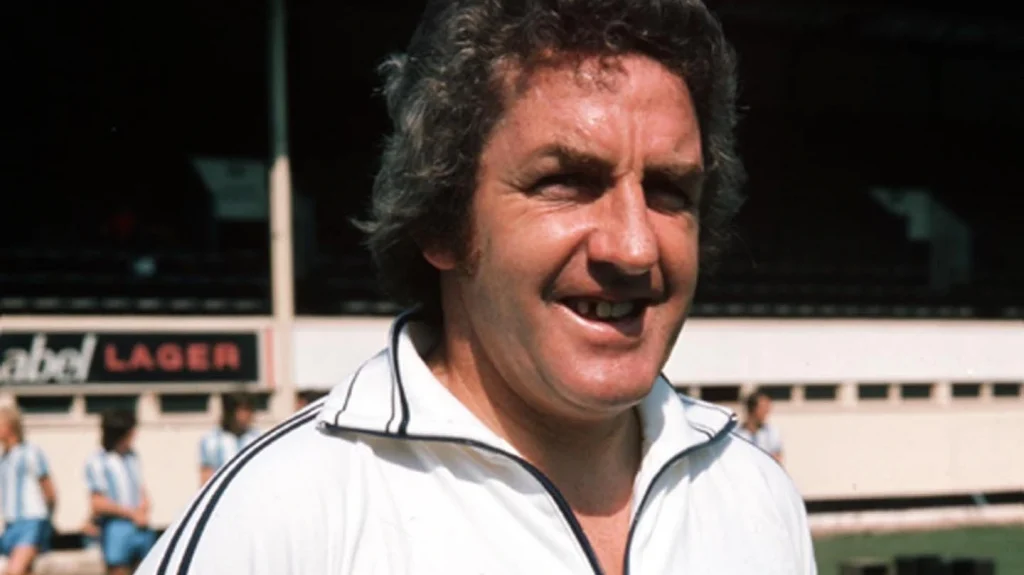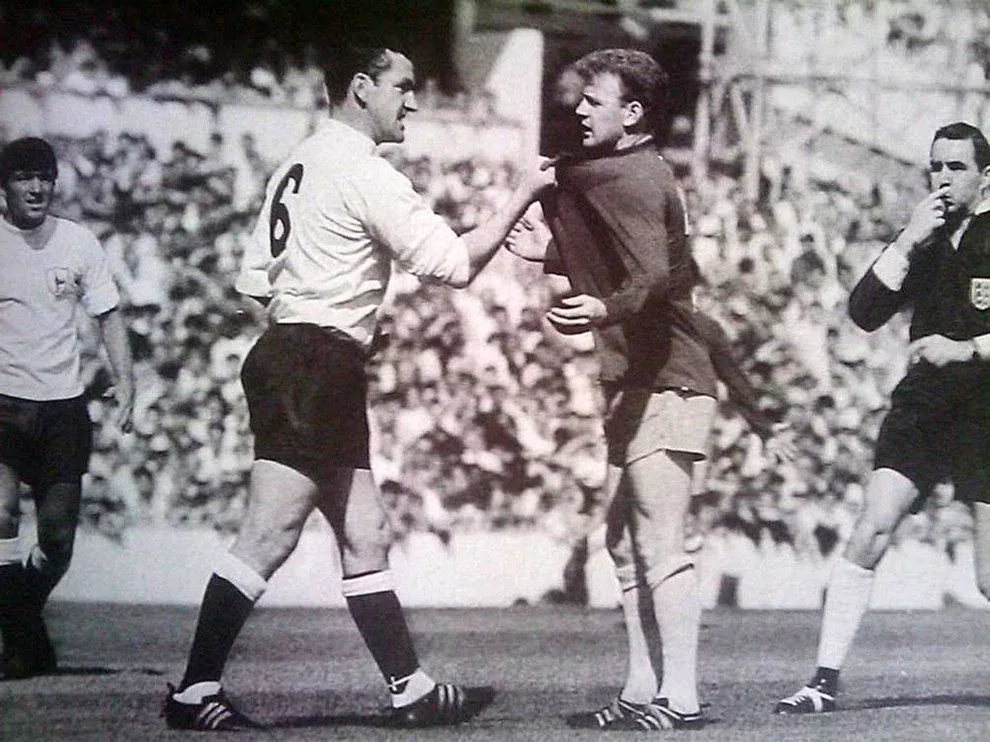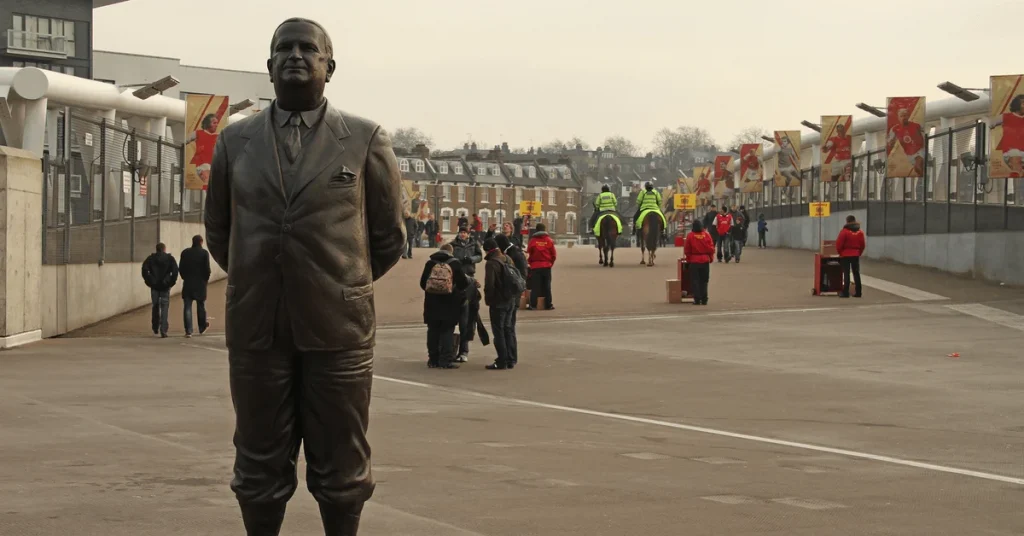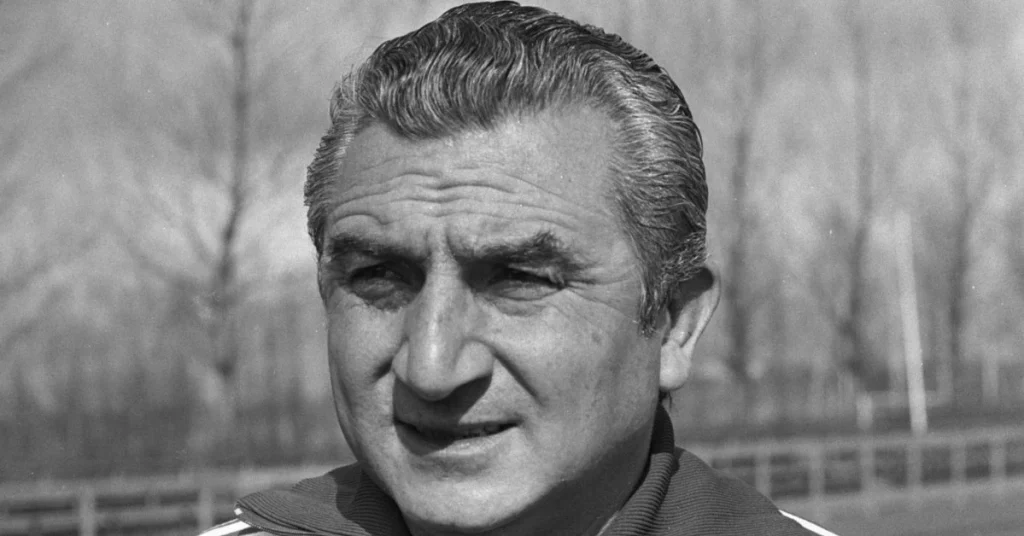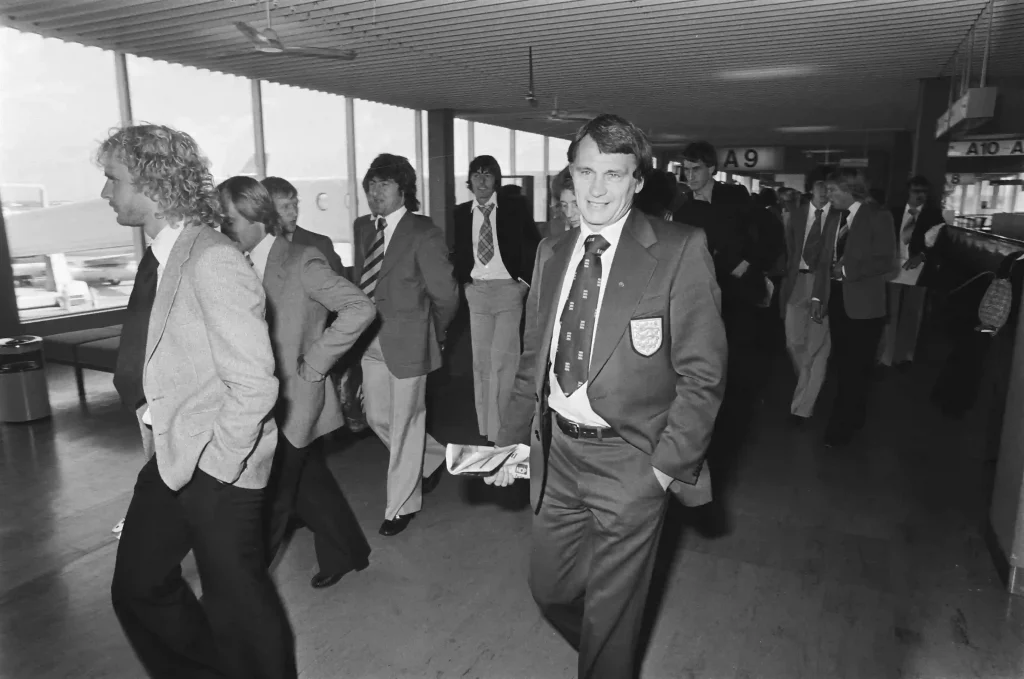Dave Mackay was one of the greatest players in British football during the post-war period. A barrel-chested left-half, his gritty determination, and powerful tackle often marked him out as one of the game’s hard men. Still, he also possessed excellent distribution and an astute football brain.
Dave Mackay Childhood
Dave Mackay was born in Edinburgh, close to Hearts Tynecastle ground, on 13 November 1934. He first came to prominence in schoolboy football.
He was capped against Ireland in the U14 schools’ international in April 1949 (the school leaving age in Ireland was 14 as opposed to 15 elsewhere in the UK, so internationals were played at the younger age group). Scotland lost the game 3-2, but David Craig Mackay was one of the few players singled out for praise.
He missed out on the Victory Shield games the following season but was selected for the squad for an additional fixture against England in April 1950. This match was the first-ever schools’ international to be played at Wembley stadium.
Although not in the starting line-up, Mackay was one of the five reserves, and when Scotland lost two players through injury in the opening 25 minutes, he came on as a substitute at inside left.
However, this was an even more sad occasion than his first cap, for a rampant England with Johnny Haynes in full flow ran out 8-2 winners in front of a crowd of 53,098.
Dave Mackay left school having already made his mark in the soccer world, but with no formal training system in the game at this time, he began a five-year apprenticeship as a joiner.
His soccer journey continued with the Gorgie Boys Brigade team and also with Slateford Athletic Juveniles. His performances earned a step-up to the Juniors, one of the toughest breeding grounds for young players, when he joined Newtongrange Star.
Signing Professional Contract
By the middle of 1951, he had already been signed by Heart of Midlothian (Hearts) on provisional forms. However, Dave continued to play with Newtongrange, and in 1952-53 he was won junior international caps, featuring in the games against Wales and the Republic of Ireland.
Progress of this nature tended to herald a call-up to the senior squad, and on 7 November 1953, he made his first-team debut for Heart of Midlothian (Hearts) against Clyde at Tynecastle.
The match report in the Evening Times notes that in the first half, “Mackay twice brought Hearts back on the offensive,” but his recollections were less optimistic: “I wouldn’t have blamed them if they’d placed me on the transfer list, so shoddy was my performance.”
His career initially progressed somewhat slowly, a fact he put down to a lack of stamina, but perhaps more likely that he was working during the day and training in the evenings. Once his apprenticeship was completed, he then had to undergo a period of National Service in the Royal Engineers.
During that time, Mackay continued his career by traveling back to Scotland from the south of England to play at weekends.
Hearts were a significant force in Scottish soccer at this time, and as he established himself in the team, personal honors began to come his way. In October 1954, he produced a fine performance in an excellent team show as Hearts beat Motherwell 4-2 to lift the Scottish League Cup, the club’s first major trophy in 48 years. [1]
Dave Mackay Playing For Scotland
In February 1955, Mackay won the first of four Under 23 caps for Scotland, lining up against England at Hillsborough. Then, in April 1956, he gained a Scottish Cup winners’ medal when Hearts defeated Celtic 3-1 at Hampden.
May 1957 saw him win his first full cap against Spain and the 1957-58 season produced even more fantastic rewards as he captained the Hearts team to the Scottish League title.
Recognition came with the Scottish Player of the Year award in 1958 and a second League Cup winners’ trophy.
The Tynecastle club came close to a second consecutive league title in 1958-59, but shortly before the transfer deadline, Dave Mackay was sold to Tottenham Hotspurs, the fee of £32,000 being a record for a wing-half at the time.
Tottenham Hotspurs
Tottenham Hotspurs were struggling badly at the time, fourth to bottom of the First Division table, and with two of the three clubs below them having games in hand sufficient to catch them if they won.
Mackay instantly struck up an effective partnership with Irishman Danny Blanchflower, and Tottenham Hotspur tally of 11 points from the remaining nine games was sufficient to keep them safe from relegation.
There was a complete transformation of the club’s fortunes the following season, and the team assembled by manager Bill Nicholson began to gel.
But it was the 1960-61 campaign that was perhaps the most memorable in Dave Mackay’s career as Tottenham Hotspur swept all before them to win a League and Cup double, the first team to achieve this feat in the twentieth century.
One of Tottenham’s fiercest rivals in the 1960s was George Best, the former Manchester United player described Dave Mackay as “the hardest and certainly the bravest opponent I have ever faced.” [2]
Mackay’s nine years at White Hart Lane proved to coincide with perhaps the most significant era in the club’s history.
There was another FA Cup final win in 1962 and a European Cup Winners’ Cup success in 1963, the first time a British club had won a European trophy, although, on that occasion, he was absent due to a stomach injury.
However, there followed a lengthy spell on the sidelines after he suffered a broken leg in December 1963. The following September, he returned to action for Tottenham Hotspur only to break the same leg again in a reserve match, and he missed the whole of the 1964-65 season through injury.
He returned to captain the Tottenham Hotspurs side and led them to a third FA Cup triumph over Chelsea in 1967, the first all-London final.
Derby County
Mackay eventually left Tottenham Hotspurs for Derby County for 5,000 British pounds in 1968. Brian Clough stepped in at the last to purchase the 33-year-old as he was close to returning to Tynecastle.
A measure of his influence was that apart from his first season (when he was only present briefly), Spurs achieved a top ten position in the First Division every season he was with the club. In addition, the club has described him as “the most complete player ever to wear the Spurs shirt.”
There was even more success at the Baseball Ground as he led Brian Clough’s team to the Division Two title in 1968-69, earning a joint Football Writers’ Association Footballer of the Year award with fellow “golden oldie” Tony Book.
Brian Clough and Peter Taylor made Mackay play a sweeping role for Derby County and encouraged him to turn defense into attack through a passing game while at the club. In 1971, a year before Derby County won the First Division league championship, he left the club. [3]
Dave Mackay Entering Management
After that, he had a season as player-manager of Swindon Town before entering management.
In total, he had made almost 500 club appearances and gained 22 caps for Scotland as well as winning three FA Cups, one Scottish Cup, and both Football League and Scottish League division title and was inducted into the Scottish Football Museum in 2004.
In management, his list of clubs included Nottingham Forest, Derby County (where he led the Rams to the Football League title in 1974-75), Walsall, Al-Arabi (Kuwait), Al-Shabab (Dubai), Doncaster Rovers, Birmingham City, Zamalek (Egypt) and the Qatar Youth team.
Unfortunately, Dave Mackay passed away after a lengthy illness at the Queen’s Medical Centre, Nottingham, on 2 March 2015. Mackay died when was 80 years old.
Dave Mackay And Billy Bremner Iconic Photo
A 1966 photograph by Monte Fresco shows a confrontation between Leeds United’s Billy Bremner and the real Mackay. [6] Bremner’s shirt is in Dave’s hands as he contorts his face and grabs him.
Although Mackay hated the image because it portrayed him as a bully, it has become one of the most iconic images in UK football. [4]
When asked about this encounter, Mackay mentioned that his leg had just been broken twice and I was coming back from it. He would have accepted it if he had kicked the other one. ‘I was really miffed when the broken one was kicked. At the time, I could have killed him.’
Until his death, Dave was consistently getting asked to sign this iconic image.
5 Interesting Facts
As a player and manager, Mackay was inducted into the English Football Hall of Fame as an inaugural member in 2002.
Mackay wrote two books, “Soccer my Spur” published by Stanley Paul in 1961, and “The Real Mackay” published by Mainstream Publishing in 2004. [5]
In 1958, he was voted Scottish Footballer of the Year.
Having set up the local company Dave Mackay Ties, his name appeared on Tottenham Hotspur merchandise for many years after leaving.
Mackay’s toughest opponents were Denis Law, Cliff Jones, Jimmy Greaves, Danny Blanchflower, and Johnny Haynes of Fulham.
Facts And Figures
Full Name: David Craig Mackay
Birthdate: 14/11/1934
Died: 02/03/2005
Birthplace: Edinburgh, Scotland
Club Career:
- 1953–1959: Heart of Midlothian
- 1959–1968: Tottenham Hotspur
- 1968–1971: Derby County
- 1971–1972: Swindon Town
Total Club Games: 601 Appearances, 82 Goals
National Career:
- 1957–1965: Scotland (22 appearances, 4 goals)
Football Clubs Managed:
- 1971–1972: Swindon Town
- 1972–1973: Nottingham Forest
- 1973–1976: Derby County
- 1977–1978: Walsall
- 1978: Al-Arabi Kuwait
- 1983: Al-Shabab
- 1987: Al-Arabi Kuwait
- 1987–1989: Doncaster Rovers
- 1989–1991: Birmingham City
- 1991–1993: Zamalek [7]
- 1994–1997: Qatar
Playing Honors:
Heart of Midlothian (Hearts)
- 1954–55 and 1958–59: Scottish League Cup Winners
- 1955–56: Scottish Cup Winners
- 1957–58: Scottish League Division One League Champions
Tottenham Hotspur:
- 1960–61: Football League First Division Champions
- 1960–61 1961–62, 1966–67: FA Cup Winners
- 1962–63: European Cup Winner’s Cup Champions [8]
Derby County:
- 1968–69: Football League Second Division Champions
Management Honors:
Derby County:
- 1974–75: Football League First Division Champions
Zamalek SC:
- 1991–92, 1992–93: Egyptian Premier League Champions
Al-Arabi SC:
- 5 times VIVA Premier League Champions
2 times Kuwait Emir Cup Winners
References:
[1], [2], [3], [4], and [5]: https://en.m.wikipedia.org/wiki/Dave_Mackay
[6] and [7]: https://de.wikibrief.org/wiki/Dave_Mackay
[8]: www.blogarama.com/sports-blogs/64128-spursnetwork-tottenham-hotspur-forum-fansite-blog/41474481-book-review-dave-mackay-footballs-braveheart-mike-donovan
Images:
www.derbytelegraph.co.uk/sport/football/football-news/dave-mackay-one-greatest-names-2082659 (main image)
www.twitter.com/jamtarts/status/1327551856713756672
www.dailyrecord.co.uk/news/scottish-news/scotland-hearts-football-legend-dave-5261761
PA Wire / Press Association Images
